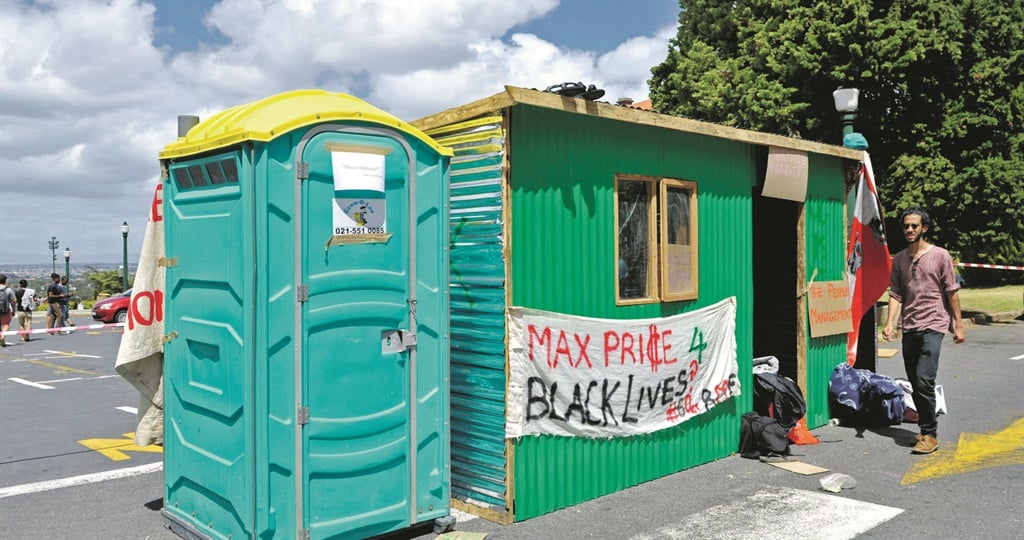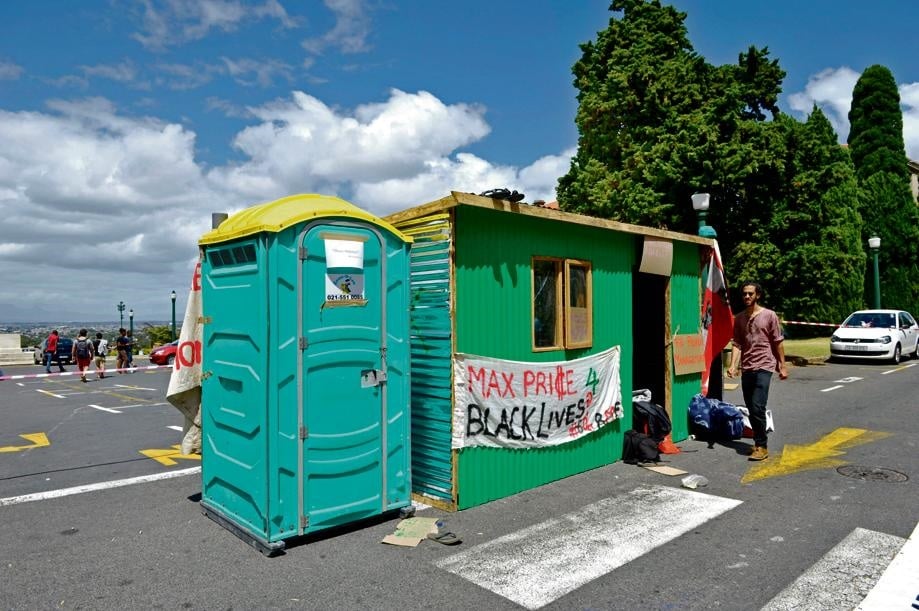
Professor Francis Petersen
The new academic year began at the University of Cape Town (UCT) on Monday. On the same day, Rhodes Must Fall (RMF) protesters erected a shack in Residence Road, between two residence halls. They were highlighting a very real, pressing need for more on-campus housing at UCT.
Though the university supports legitimate protest, and we had no problem with RMF’s message, the shack itself disrupted traffic, created safety and health challenges, and affected the functioning of the university.
RMF rejected numerous offers to engage with members of the UCT executive. So, we delivered a letter to inform them that we needed the shack to be moved about 20 metres away, where it would still be prominent. The protesters refused, making it necessary for security personnel to dismantle the shack.
The protesters’ response received wide coverage. They petrol-bombed the vice-chancellor’s office; intimidated students and staff, including incidents of assault; they engaged in vandalism and burnt four vehicles, including a Jammie Shuttle that provided free transport for students. The irony is that UCT was willing to see the Shackville protest continue because we agree that housing is a fundamental need for students.
In any university anywhere in the world, only some students are accommodated on campus; the rest live elsewhere. UCT has a student population of more than 27 000, but only 6 800 beds, for which we generally receive more than 6 800 applications each year. We have found it necessary to overallocate beds, because a certain number of students tend to turn down residence offers each year. At the same time, because of the high number of applicants, every year there are anxious students on the residence waiting list.
UCT’s residence admissions policy gives strong preference to students on financial aid, because living in res is usually cheaper than living off campus. We also give preference to young students – those who are not yet 18 – and those from outside of Cape Town. Only about 150 places are allocated to students who live in Cape Town, to ensure that we have a diversity of people in residence – geographically, academically and socioeconomically.
This year, UCT’s student housing office faced a “perfect storm”. To begin with, an unusually high proportion of students accepted their housing offers for 2016. Secondly, a large number stayed in res through January to take their deferred exams, which were offered when the fees protest interfered with UCT operations during the exam period in November 2015. Thirdly, we received requests for assistance from a number of students who either had not been successful in applying for accommodation, or who had not applied for it at all, but who had no other living arrangements. And finally, RMF protesters occupied the student housing office for three days, making it impossible for staff to do their jobs.
Despite these obstacles, we found accommodation for everyone who had received an offer in residence through the formal application process. We also managed to find off-campus accommodation for more than 2 000 additional students. As of last Wednesday, there remained about 50 students in temporary accommodation that was being paid for by UCT while we helped them look for something more permanent.
RMF has claimed that black students are being excluded from res housing, but more than 75% of our rooms are allocated to black students. This proportion has risen year on year.
UCT agrees on the challenges of transformation that RMF has raised. We’ve tried many times to engage with RMF and explain the issues involved in their demand for more student housing – a demand we support, because it has been found that students who stay in res tend to perform better academically. But we cannot engage with violence.
Petersen is a deputy vice-chancellor at UCT
Wanelisa Albert
People seem to think decolonisation is about rallying peacefully around statues while we wait for colonial administrators to take them down. Decolonisation is the self-discovery of the natives’ humanity and the struggle to destroy the system that continuously dehumanises them through excessive violence.
The University of Cape Town (UCT) forms part of this anti-Black system. However, even though it absolves itself from colonisation and apartheid, the fact that it is built on stolen land, received state funding and consulted colonial governments on how to further subjugate Black people proves its very foundation is held firm by the bones of enslaved and dispossessed Black people.
Unsurprisingly, today UCT opens its doors to Black students with two conditions: assimilate into whiteness and actively participate in anti-Blackness, or die. Many Black students leave the university in body bags due to high rates of suicide because of a racist institutional culture, unreasonable academic demands and the alienating environment. There are a growing number of Black students living with depression and other mental illnesses. How does an institution that has paid R2 million on private security in four months only have four psychologists to attend to 27 000 students?
It is this crisis, accompanied by the housing, financial and academic exclusions, that forced Rhodes Must Fall (RMF) to take radical action. After the deferred exams, the university started kicking Black students out of residences while, simultaneously, poor Black first-years were arriving to discover they were homeless. This happened after a serial rapist had attacked five women on campus in one month. In response, RMF occupied an administration building and forced management to find alternative, humane accommodation for students. More students kept reaching out to RMF for help, but the university had evicted RMF and it no longer had the resources to help. Management continued to antagonise RMF with private security, vice-chancellor Max Price refused to engage with RMF, and the institution refused to take responsibility for its ongoing crisis.
On Monday, RMF erected a shack on campus in protest. It was called Shackville: Homeless at UCT. As more students became homeless, and financially and academically excluded, Shackville gained increasing relevance. The next day, two senior managers approached RMF with a warning to remove the shack in an hour or security would remove it by force.
UCT, while refusing to register students due to financial and academic exclusion, increasing homelessness, the deaths of three students in one month and a serial rapist on campus, decided the most plausible solution was to threaten pained students? Naturally, students felt undermined and antagonised, resulting in the symbolic burning of colonial paintings in defiance.
The police fired stun grenades and rubber bullets at unarmed students for three hours. Private security kidnapped and violently assaulted one student, who is part of RMF but was not at the protest. Throughout the night, police escalated the violence (even shooting at students who were not protesting). As a result, students burnt a UCT vehicle and the office of the vice-chancellor.
Many have criticised the RMF movement due to the vandalism and violence. It is curious to me that people are more concerned about the paintings of white racist serial killers than the lives of poor Black students. What is even more surprising to me, however, is the shock society expresses when a movement like RMF, which has been very upfront about its intention to decolonise, is engaged in decolonising.
Frantz Fanon describes decolonisation as “the meeting of two forces, opposed to each other by their very nature”. It seems that when an institution like UCT, bent on maintaining colonial legacies and white supremacy through the dehumanisation of Black bodies, meets a radical force like RMF, violence is inevitable. Decolonisation asks no permission.
Decolonisation is violent. It messes with the colonial order that maintains Black bodies as subservient beings over a violent, white supremacist superstructure.
Decolonisation is only violent because the introduction of colonialism was violent and the maintenance of colonialism through institutions like UCT is through violence.
Albert is a student activist and a member of Rhodes Must Fall and Fees Must Fall




 Publications
Publications
 Partners
Partners










